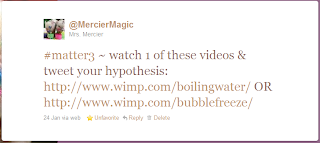Bad Breakup
Defriend. Unfollow. Defriend. Unfollow. It all depends which social media network you use. Facebook defriends. Twitter unfollows. Which is the worse breakup? It all depends on how you look at it.
I have two accounts on both Facebook and Twitter. One for my classroom and one for myself. My goal for my classroom is to inform my students' parents and possibly other classrooms what's happening in my classroom. I find the two social media platforms to be a non-threatening way to update parents. At the same time they empower my students because they are the ones who do ninety percent of the posting to our pages. My personal Facebook page is a way for me to keep in touch with old and new friends as well as family members. I even subscribe to some of my favorite educational pages like ASCD, Responsive Classroom, and Edutopia. My personal Twitter page is a way for me to learn from and with educators around the globe.
On my classroom Facebook page, I expect people to stop liking me. When a parent's child, or the child, is no longer in my classroom I do not realistically expect them to take an interest in what the current students are engaged in. The same is true form my classroom Twitter page; I expect them to stop following our tweets. I have different expectations for my personal accounts.
Twitter makes it easy to follow someone. You click on the person's profile and the click follow. Depending on how they have their account set up, they may or may not get a message that you are following them. When you follow someone on Twitter you will see what they write in your timeline/feed, but they won't see yours unless they follow you as well. Maybe at some point you'll want to unfollow someone on Twitter. Why might you unfollow someone? It all depends. Because I personally use Twitter to grow and learn from other educators I may unfollow someone for a variety of reasons. Maybe I completely disagree with their educational philosophy. Maybe they tweet more personal things than professional. When I unfollow a fellow educator on Twitter it really is me and not them. I have yet to see another educator become upset because someone unfollowed them. It's as if there is an understanding between us educators on Twitter that we are to take care of our own needs. Whether or not they know will depend on how closely they monitor their followers. The good news is that I can always follow them again if I happen to change my mind.
Facebook requires that you find the person and send them a request at which point the person has to agree to be your friend. Once you are friends, you will see each other's posts in your timeline/feed. I have blocked people from my news feed. An interesting option because it allows you to stay friends with the person while not being overwhelmed by their Facebook posts, and not hurting their feelings (they don't know you blocked them). Some Facebookers post in the double digits a day! One of the hardest things to do is to defriend someone. Why defriend someone? Betrayal. Disagreement. Loss of interest. What makes it such a difficult decision is that the person is notified that you defriended them. Yes, you can always patch things up and become friends again, but would you want to befriend someone who publicly broke up with you?
Regardless of which social network you on, make sure you know what your purpose is for using it. Within that knowledge is the comfort you will need when you have to break-up with someone online. Publicly.

Comments
Post a Comment